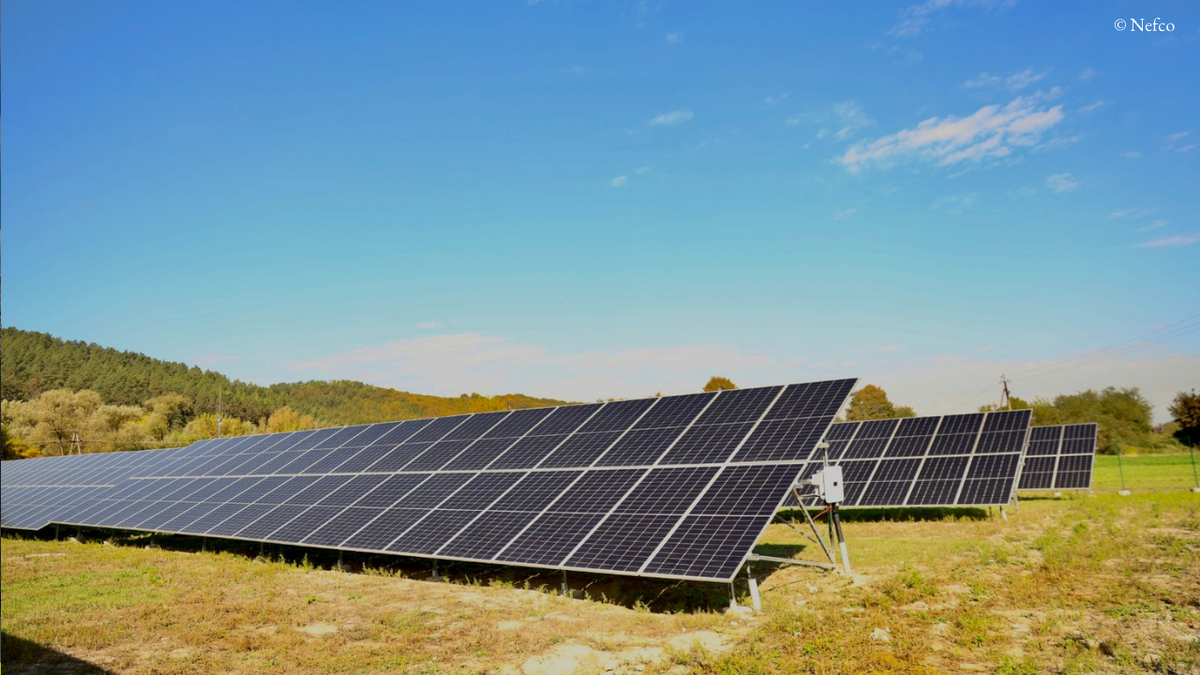Actualités • Membres
SOLAR ENERGY BECOMES A REALITY: CHORTKIV WATER UTILITY SWITCHES TO RENEWABLE SOURCES

On September 23, 2025, three solar power plants were officially commissioned in Chortkiv, built to support the city’s water supply and wastewater systems of the municipal utility company KP “Chortkiv Water Utility.” The project marks an important step in the development of renewable energy and the enhancement of energy security for critical infrastructure. It was implemented with the support of Nefco and funding from the E5P Fund, with the Egis team in Ukraine serving as technical advisor and consultant.
Amid ongoing attacks by russia on Ukraine’s energy infrastructure, solar energy has the potential to become a critically important source of power, contributing to a more reliable, decentralized, and resilient energy system. The project aims to produce “green” electricity for the water utility, ensuring the uninterrupted operation of pumping stations and treatment facilities. With a total capacity of 340 kW, the plants can cover around 20% of the facilities’ electricity needs while guaranteeing the reliability of water supply.
The project was funded by the Eastern Europe Energy Efficiency and Environment Partnership (E5P) through a €460,000 grant, with Sweden providing technical assistance worth €54,960, and the city of Chortkiv contributing co-financing of €33,846.
“By implementing this project, Chortkiv has shown that even under the difficult conditions of war, such initiatives are possible thanks to the support of international financial institutions and donors. This approach gives hope that Ukraine’s long-term reconstruction will focus not only on restoring what was destroyed but also on transforming the country into a more sustainable, energy-independent, and environmentally safe state. It also serves as an example for other cities on how to build modern infrastructure with a focus on the green transition and energy efficiency,” said Volodymyr Shmatko, Mayor of Chortkiv.
“With the support of E5P donors, Chortkiv now has clean electricity and reliable water services — an important step towards resilience and sustainable development in these critical wartime conditions,” said Kateryna Stasyuk, Head of the Eastern Europe Energy Efficiency and Environment Partnership (E5P).
Egis team supported the project at every stage — from planning and tender procedures to technical supervision during construction and commissioning. The collaboration between Egis, Nefco, and local authorities took place through regular meetings and approvals, ensuring the water utility’s needs were met and that the project complied with international standards.
Reliable Water Supply and Energy Independence
The installation of solar power plants ensures uninterrupted water supply for over 15,000 consumers, even under the challenging conditions of war. Using renewable energy allows pumping stations and treatment facilities to operate continuously, reducing dependence on centralized electricity sources and increasing the community’s energy resilience.
“Solar energy offers many advantages compared to other energy sources, even renewable ones,” explains Jyrki Rautamäki, Senior Consultant at Nefco. “Solar power plants are cost-effective, quick to install, and significantly safer than fuel-based generators. They operate quietly, require less maintenance, and provide more reliable performance compared to mechanical systems that are prone to breakdowns. In addition, solar panels are durable and long-lasting. This is why solar energy is a simple and effective solution when additional power capacity is needed.”
The Role of Egis in the Project
Within the project, Egis acted as a technical advisor and implementation consultant, providing:
- Strengthening the institutional capacity of the project implementation team and water utility staff for effective project management;
- Support for local procedures and tender processes in line with donor requirements;
- Technical supervision, contract administration, and quality control of works;
- Recommendations on optimal solar plant locations, equipment operating schedules, and grid connection.
Benefits for the Water Utility
The implementation of solar power plants brings significant economic advantages for the Chortkiv water utility. Key benefits include reduced electricity costs, the opportunity to sell surplus power to the grid as an “active consumer,” increased energy efficiency, reduced dependence on fossil fuels, as well as optimized operational costs and improved financial sustainability. This creates a solid foundation for the long-term economic efficiency and energy independence of the utility.
Technical Scope of the Project Included:
- Construction of three solar power plants with a total capacity of 340 kW and installation of over 417.6 kWp of solar panels;
- Integration of an automated energy accounting system, video surveillance, and lightning protection;
- Optimization of pump and aerator operations for maximum efficiency;
- Careful selection of sites and connection points to ensure the efficiency and stability of the stations.
“The Chortkiv project has shown that success in small cities depends on several key factors: when local authorities support the initiative, there is a clear technical brief and independent oversight, access to financing such as Nefco and E5P, and experienced contractors. Equally important is training personnel and ensuring continuous technical monitoring — only then can solar power plants operate efficiently and reliably,” said Oleksandr Baran, Egis project expert.
The Chortkiv project demonstrates that investments in renewable energy can be both practical and economically beneficial. Solar power plants provide a stable water supply for thousands of residents, reduce utility costs, and cut CO₂ emissions, creating a model for other cities in Ukraine to follow. It is expected that replacing part of the grid electricity with solar energy will reduce CO₂ emissions by approximately 300 tons per year and save the city budget around €70,000 annually.
The project was made possible through the joint efforts of Egis, Nefco, the E5P Fund, KP “Chortkiv Water Utility”, Chortkiv City Council, and NES Group. This coordination has proven that decentralized energy sources can operate successfully even in small communities, laying the foundation for sustainable development.


